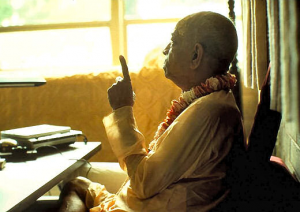Dec 28 1969 Boston
So our propagation is to present Bhagavad-gītā as it is, without any nonsensical commentation. There is no need of nonsensical commentation. Bhagavad-gītā is as clear as the sunlight. As you do not require to see the sun with another lamp, similarly, you do not (chuckling) require to study Bhagavad-gītā with another commentation of a common man who has no knowledge. Bhagavad-gītā as it is, you should study. Then you will get all this knowledge.
…So it is natural. If we keep ourself in natural life, it is natural. But because we are developed consciousness, we do not keep in natural life. We accept so many unnatural things. Therefore our knowledge becomes covered by unnatural material nature. So that has to be cleared by superior instruction. Ceto-darpaṇa-mārjanam [Cc. Antya 20.12]. Therefore we have to take; voluntarily we have to accept. Just like a man who lives naturally, he never gets disease. But one who lives… Just like you don’t find any disease amongst the animals. But amongst the human beings, oh, there are so many medical science, so many things. Why? They live unnaturally. So if you live naturally there is natural evolution, but if you block the natural course, then how you can do it? If you lit fire and let it go, it will grow. But if you pour water in it, how it will grow? So in the human form of life we do not go according to natural intuition. Just like amongst the animals, amongst the birds you’ll see. Take the pigeons. You give them some peas—they will eat. But if you give them some particles of meat, they’ll not eat because they are living natural life. A tiger, he will not accept. You give him nice foodstuff, prepare your vegetables, he’ll not accept. So natural life evolves up to the animal life. But when you come to the human form of life you have got developed consciousness, and instead of using your intelligence and consciousness for further develop naturally, you put unnatural impediments; therefore you are covered. That is called yadā yadā hi dharmasya glānir bhavati, tadātmānam [Bg. 4.7]. Therefore you require instruction of Kṛṣṇa.
Guest: One of the major criticisms today of most religions are their irrelevance to tackling the social problems or immediate external problems. You talked about things beyond the self. In the Bhagavad-gītā I think you have references such as Arjuna being told not to become attached to the fruit of his actions, but act. Can you give us some idea of, more specific idea, of the principles which would guide one’s action while trying to develop Kṛṣṇa consciousness?
Prabhupāda: That principle is stated as the ultimate instruction of Bhagavad-gītā, that sarva-dharmān parityajya mām ekaṁ śaraṇaṁ vraja [Bg. 18.66]. We have got two kinds of religion. One is called, what is called, pravṛtti. Pravṛtti means we are inclined, because we have got this material body, we are inclined to material activities. That is called pravṛtti-mārga. Indriyāṇi parāṇy āhur [Bg. 3.42]. This body means senses. So because so long we are absorbed in this bodily concept of life, then we try to give comforts to the senses, sense gratification. This is one stage. So dharma means occupation. People are engaged in various types of occupational duties for sense gratification. Sometimes in religion they say you’ll go to heaven. What is that heaven? That is also sense gratification. You’ll live so long years, you’ll have so many beautiful wives and so many things, so many things. All flowery language. What is the basic? Sense gratification. That’s all. This is one way. Another way is nivṛtti-mārga. When one has seen perfectly that “This process of sense gratification cannot give me actual happiness,” then they began to give it up. Just like the Māyāvādī philosophy. They say brahma-satyaṁ jagan mithyā: “This world is false.” Just like in your country, a section of youngsters, they’re disgusted with this materialistic way of life. They have taken to the hippies’ path. Why? It does not give satisfaction, but they do not know the right way. They have taken a wrong way, hippies. So this is called accepting and rejecting.So Kṛṣṇa says, “You have to give up all this nonsense accepting and rejecting. You have to take to Me, then you’ll be happy.” Sarva-dharmān. Sarva-dharmān means some religious occupation is for sense gratification and some religious occupation is rejection of this material world. So we have to give up both these, the acceptance and rejection. We have to accept the Kṛṣṇa’s path, Kṛṣṇa consciousness. “Surrender unto Me.” Then we’ll be happy.



